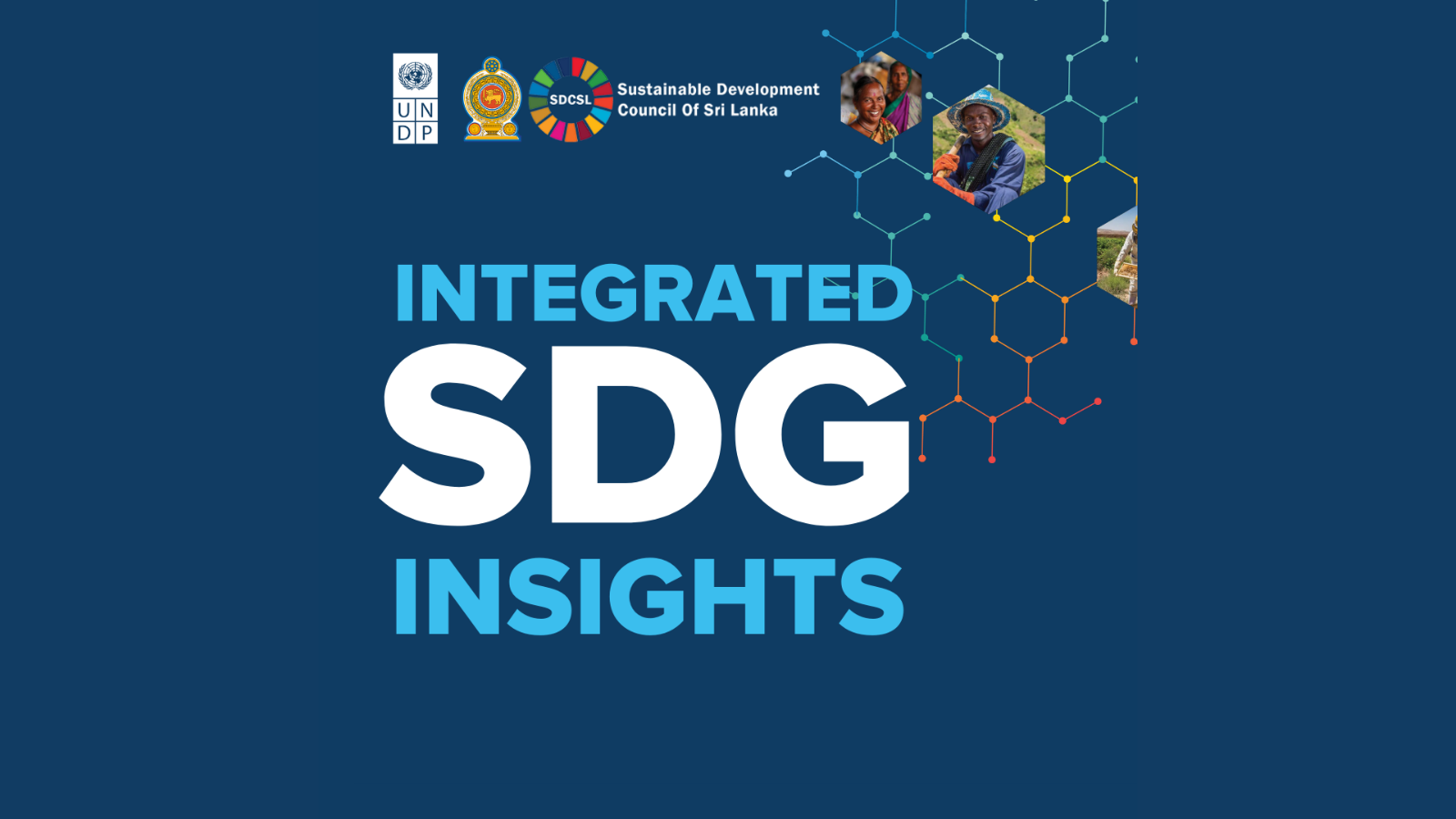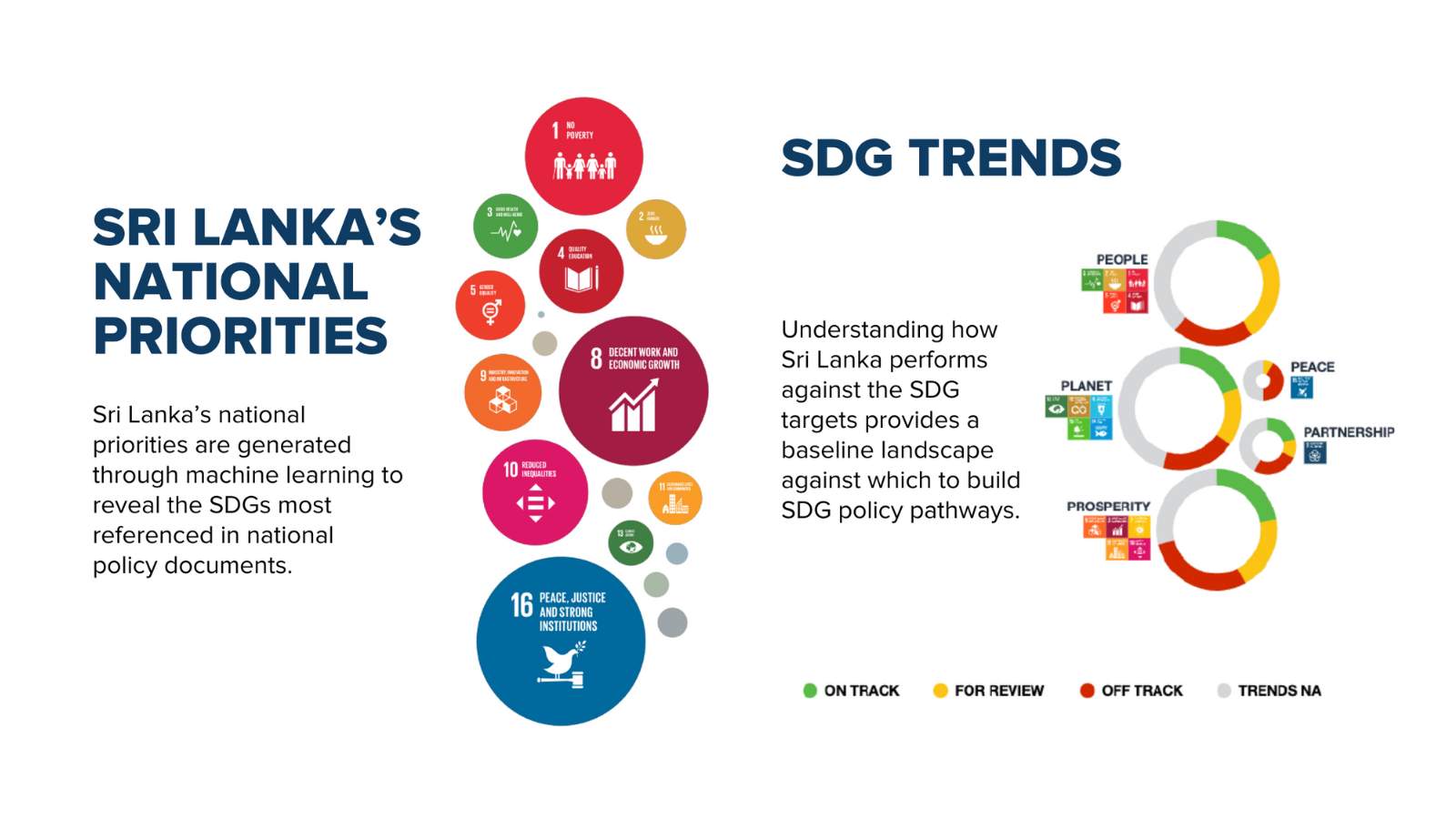Co-authored by Azusa Kubota (Resident Representative, UNDP in Sri Lanka) and Chamindry Saparamadu (Director General, Sri Lanka Sustainable Development Council)
At Halftime but not Halfway: The Integrated SDG Insights Report for Sri Lanka
September 16, 2023

Integrated SDG Insights Report for Sri Lanka
This year marks the halfway point for the achievement of the global Sustainable Development Goals (SDGs), a bold game plan signed by 193 world leaders in 2015 to improve the quality of life for all people in the world by 2030.
Seven years in, we are at the halfway mark of the SDGs, but globally we are down at halftime with only 15% of the goals on track.
The SDG Summit 2023 being held tomorrow in New York marks the beginning of a new phase of accelerated progress towards the SDGs and aims to galvanize global engagement towards 2030 targets. In line with this, the national SDG Forum was held recently led by Sri Lanka's Sustainable Development Council to take stock of the country's own progress while focusing on a renewed call for action to accelerate Sri Lanka's SDG trajectory.
Sri Lanka is committed to reversing the adverse impacts of successive setbacks the country has faced in recent years by concretely reducing poverty, elevating human development and achieving sustainable growth while addressing the needs of the most vulnerable.
The national SDG dashboard launched at the SDG Forum last month, shows Sri Lanka has made progress over the years in some areas such as eradicating extreme poverty, reducing undernourishment and malnutrition, enabling access to basic services such as drinking water, sanitation, electricity, health care, education, controlling violence and formulating policies and strategies on climate change. However, progress against some SDGs has regressed or remains stagnant. Complementing this, the recently launched Sri Lanka Multidimensional Vulnerability Index (MVI)
by the United Nations Development Programme (UNDP) and the Oxford Poverty and Human Development Initiative (OPHI) shows how debt status, disaster preparedness, piped water and years of schooling have emerged as the
primary driving forces behind increased vulnerability, with 55.7% of Sri Lankans being regarded multidimensionally vulnerable.
A constrained fiscal space due to the combined impact of low revenue, high debt servicing costs and constraints in accessing commercial capital means chat investments in the SDGs are likely to remain a challenge. The MVI indicates attaining SDGs in a tight fiscal environment calls for far-reaching and integrated policy and programme investments to build resilience of the institutions and profile to withstand future setbacks.
The Integrated SDG Insights Report, a knowledge product developed by UNDP in collaboration with 95 national
governments the world over, considers countries' constrained resources and provides suggestions on investment areas for the acceleration of overall SDG progress. The Report, co-produced in Sri Lanka by UNDP and the Sri Lanka
Sustainable Development Council, uses an Artificial Intelligence (AI) based model for SDG classifications that considers over 100,000 phrases and expressions to identify the alignment of Sri Lanka's national policies with the SDGs. This is then overlaid with an analysis of interlinkages between SDGs at the target level SDG interlinkages reveal how actions and investments directed towards one SDG can impact the progress of others.

Combined, this analysis identifies SDG acceleration pathways for Sri Lanka and highlights policy investments with the most potential to drive overall SDG progress forward. These acceleration pathways are:
- Target 1.4: Equal rights to ownership, basic services, technology, and economic resources.
- Target 2.4: Sustainable food production and resilient agricultural practices.
- Target 7.2: Increase percentage of renewable energy.
- Target 8.5: Full employment and decent work with equal pay.
- Target 16.6: Develop effective, accountable and transparent institutions.
- Target 17.3: Mobilize financial resources for developing countries.
Achieving the above targets offers the most potential for a positive impact on many other SDG targets, with minimum negative trade-offs. For example, investment in SDG target 1.4 contributes to SDG 2 (zero hunger) by ensuring access to productive resources for vulnerable groups and to SDG 5 (gender equality) by supporting women's economic empowerment.
Similarly, investment in target 2.4 will aid in mitigating the impact of climate change in agriculture so that the sector's contribution to national GDP (7.5% in 2022) can increase. Propelling SDG target 7.2 forward can foster economic growth by achieving higher levels of economic productivity ( target 8.2) and sustainable industrialization ( target 9.2) while also encouraging responsible consumption.
Increasing investments to accelerate target 8.5 will aid Sri Lanka in achieving decent work and productivity. This will have a multiplier effect on progress against other SDG targets, including the creation of new economic opportunities for women and men, young people and persons with disabilities (PWDs ), while in turn contributing to the achievement of SDG 10 (reducing inequalities).
The Report also highlights chat an enabling ecosystem, characterized by accountable, effective institutions backed by a robust financial foundation, is paramount. Therefore, the Report clearly shows the importance of investment in SDG target 16.6 ( effective accountable and transparent institutions at all levels) as it has a positive impact on every other one of the 17 goals, with no identified trade-offs, showcasing the importance of a policy and investment push towards strengthening good governance and rule of law. This makes it increasingly evident that SDG 16 plays a pivotal role in determining the overall success of SDG achievement. Considering current fiscal constraints in Sri Lanka, making progress towards SDG 17 poses formidable challenges. This underscores the vital importance of sustainable financing and the need for the international community to come together in order to bridge the gap.
A focus on the acceleration pathways should be undertaken with a clear understanding of potential trade-offs and how these can be effectively managed. For example, as shown in the Report, increased productivity and production in the food sector should not come at the cost of increased pollution or a higher dependency on fossil fuels. A transition to renewable energy should follow an inclusive approach to ensure accessibility to energy for all and should not exploit natural resources (e.g., SDG 6.3 on water).
At this critical milestone on the path to achieving the global goals, Sri Lanka is presented with a unique opportunity to ensure chat the country recovers from the current crisis in a more sustainable and inclusive manner. This aspiration depends on Sri Lanka's ability to effectively mobilize and deploy required resources to the right places to achieve the SDGs. Let us use this opportunity to regroup, re-energize and recommit to sustainable development for all.
To access the full report, log on to: https://sdgpush.undp.org/reports

Co – authored by Azusa Kubota, Resident Representative, UNDP in Sri Lanka and Chamindry Saparamadu, Director General, Sri Lanka Sustainable Development Council

 Locations
Locations



